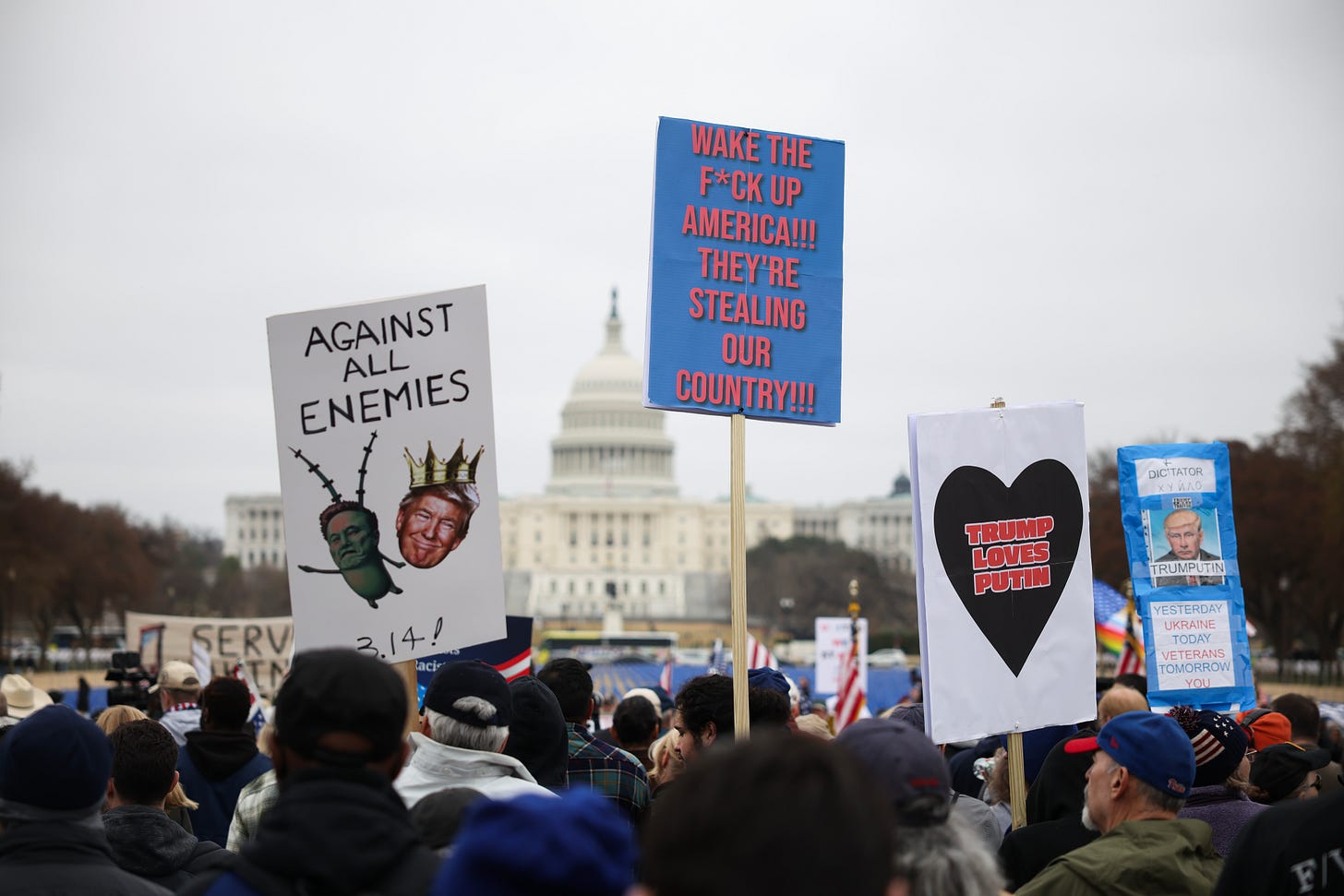'Vets Say No': Protesting Trump's 'moral injury' on troops in U.S. cities
Courts and veterans are pushing back on Trump's self-styled war on blue cities.
Visit this page again later tonight for the full interview with Professor Rowen.
Nearly half a year into Donald Trump’s efforts to deploy the military into U.S. cities, federal courts so far have staved off every attempt but one in Los Angeles. Now, dozens of protests are springing up across the country to announce veteran opposition to the policy.
Under the banner of “Vets Say No,” the nationwide protests coalesced around the slogan: “no to ICE, no to occupation, no to fascism, and no to cuts stripping away life saving services our communities need,” according to their call to action.
University of Massachusetts at Amherst legal scholar Jamie Rowen, who routinely focuses on veterans issues, said in an interview that Trump’s policy reminds many Vietnam veterans she speaks to about the “moral injury” they suffered in combat.
“They’re worried that what you’re going to see in these younger active duty military men engaging in these types of enforcement is a similar moral injury, where they’re going to feel that they were participating in something that was wrong and immoral, and that’s going to affect their sense of self moving forward,” Rowen said in an interview.
Days before the interview, U.S. District Judge Karin Immergut issued a permanent injunction blocking Trump’s order sending the National Guard into Portland as illegal and unconstitutional.
“After analyzing these statutory provisions, as applied to the facts in this case, this Court arrives at the necessary conclusion that there was neither ‘a rebellion or danger of a rebellion’ nor was the President ‘unable with the regular forces to execute the laws of the United States’ in Oregon when he ordered the federalization and deployment of the National Guard,” Immergut wrote in a 106-page ruling.
Rowen explained how the Trump-appointed judge’s ruling fits comfortably within her conservative bona fides.
“What you see from Trump-appointed judges that care about states rights is a recognition that this administration, although representing the Republican Party, doesn’t embody any of the values that many people who identify as conservatives, particularly states rights conservatives, value,” she noted.
Debunking “antifa”
Tucked inside the lengthy ruling, Immergut debunked Trump’s rhetoric about “Antifa.”
During a trial, Portland Police Bureau (PPB) Commander Franz Schoening testified that “Antifa” is an ideology rather than an organized movement.
“With thirteen years of experience policing in Portland and at least eight working for PPB’s Rapid Response Team, Commander Schoening also testified that, at least in Portland, ‘Antifa’ is not an organized group and is a term frequently misused,” the ruling states. “Although passing references to ‘Antifa’ ascribe ideology to a few protesters at the ICE facility, there is no evidence corroborating that ideology, or demonstrating leadership or differentiation among protesters based on this label.”
The brief passage of Immergut’s ruling carries considerable weight considering Trump’s executive order purporting to declare “antifa” a domestic terrorist organization, a phrase that is meaningless under U.S. law. Since the First Amendment protects the right to freely associate, there is no U.S. law creating or punishing so-called domestic terrorist organizations, only foreign ones.
Trump’s former FBI director Christopher Wray gave similar testimony to Congress in 2020.
“When we think about the Red Scare in the United States, people can be afraid of ideologies such as communism, but what they’re really scared of is that there’s an organized group of people committed to that ideology that might engage in violence,” Rowen said. “That is the lie that has been repeated in a lot of right-wing media that Trump is using to make claims that he needs to deploy the National Guard, and this judge with the testimony of a police officer debunks it completely.”
“Absolutely livid”
With active injunctions currently blocking deployments in Portland and Chicago, Trump only has been able to send the military to Los Angeles and Washington, D.C., as the Supreme Court considers his power over U.S. troops on domestic soil.
Senior U.S. District Judge Charles Breyer found earlier this year that Trump’s Department of Defense violated the Posse Comitatus Act by instructing troops to take actions that amounted to prohibited civilian law enforcement.
Professor Rowen noted that the military isn’t trained for that purpose.
“They’re not trained in constitutional rights,” Rowen said. “They are not trained in any domestic law enforcement that has to think about Fourth Amendment search and seizure protections, and Fifth Amendment due process protections.”
Some veterans, Rowen noted, find the concept of Trump sending troops to blue cities to be “insulting” to the service.
“Then on top of that, we have a government shutdown where people are not getting the benefits that they deserve,” Rowen said. “These are people who are trying to get their GI Bill benefits for education. They can’t actually access their benefits because, even though most of the VA workers are exempt from the shutdown, there are still closures at the agencies that are providing the benefits for veterans. And they’re livid. They’re absolutely livid.”
Find full listings of “Vets Say No” events nationwide here.
Postscript
In the spending bill to reopen the government, Senate Republicans tucked in a provision that would let eight of their Trump-loyalist colleagues sue the government because Jack Smith lawfully subpoenaed their phone metadata during his 2020 election subversion investigation.
If the senators win — or Trump’s Justice Department settles their lawsuits — they would be entitled to at least $500,000 each for every “instance of a violation.” I break it down here on Legal AF.




I drove from Western Massachusetts to Boston yesterday. There were a few Veterans groups protesting at overpasses on the MassTurnpke. I was driving so I couldnt wave but they heard my horn !
Super Necessary 🫡🇺🇸